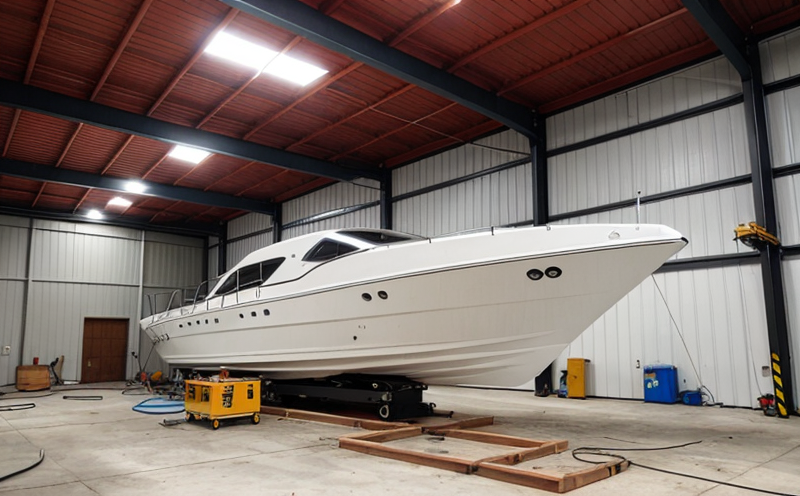ISO 180 Charpy Impact Testing of FRP Ship Panels
In the dynamic and challenging marine environment, ensuring the structural integrity of ship hulls is paramount. Fiberglass Reinforced Plastics (FRP) have become a popular choice for ship construction due to their excellent strength-to-weight ratio, durability, and resistance to corrosion. One critical aspect in assessing the quality of FRP materials used in shipbuilding is through ISO 180 Charpy Impact Testing. This testing method evaluates the notched impact toughness of these materials, providing insights into their ability to withstand sudden impacts or shocks without fracturing.
The Charpy V-notch test involves subjecting a specimen, prepared with a specific notch, to an impulse load. By measuring the energy absorbed by the material during fracture, this test assesses the resistance to brittle fracture. For FRP ship panels, this testing is particularly relevant due to potential impacts from debris or other objects in harsh marine conditions.
The ISO 180 Charpy Impact Test is conducted following international standards that ensure consistency and reliability across different laboratories worldwide. The process involves precise specimen preparation, controlled environmental conditions, and the use of specialized testing machines capable of delivering accurate impact loads. This ensures that each test provides a valid assessment of the material's integrity.
The significance of this test extends beyond compliance with regulatory requirements. Understanding the Charpy impact properties helps in optimizing design parameters for ship hulls to meet operational demands while ensuring safety and performance. The insights derived from this test contribute significantly to R&D efforts, enabling continuous improvement in materials and manufacturing processes. For instance, knowing the critical notched impact toughness can inform decisions on selecting appropriate FRP grades for specific areas of a ship.
Moreover, compliance with ISO standards is crucial for maintaining certification and ensuring that products meet international quality benchmarks. This is particularly important in the marine sector where stringent safety regulations are enforced to protect both personnel and assets at sea. By adhering to these standards, manufacturers can enhance their reputation and trustworthiness among industry stakeholders.
Given the importance of this test, it's essential to choose a laboratory that has expertise in performing Charpy impact tests for FRP materials. Our facility is equipped with state-of-the-art equipment and trained personnel who understand the nuances of testing such materials accurately. This ensures reliable results that can be trusted by clients across various sectors.
Applied Standards
| Standard | Description |
|---|---|
| ISO 180 | Absorption of notched impact energy in the Charpy V-notch test. |
| ASTM D256 | Determination of the notched and un-notched impact properties of plastics. |
| EN 13976 | Impact testing for composites used in marine construction. |
| IEC 60270 | Determination of the notched impact strength of electrical insulating materials by means of a pendulum impact test machine. |
The tests mentioned above are widely recognized for their accuracy and reliability in assessing the performance characteristics of FRP materials, especially those used in shipbuilding. Our laboratory ensures compliance with these standards to provide clients with consistent and trustworthy results.
Why Choose This Test
The Charpy impact test is particularly important for FRP ship panels because it provides a direct measure of the material's resistance to brittle fracture, which is crucial in marine environments where sudden impacts are common. Here’s why this test stands out:
- Assesses Brittleness: The Charpy impact test quantifies how much energy a material can absorb before fracturing, highlighting its brittleness.
- Performance Assurance: By ensuring that the FRP meets the required notched impact toughness levels, this test assures optimal performance of ship hulls under operational conditions.
- Regulatory Compliance: Meeting ISO standards is essential for maintaining certification and adhering to international quality benchmarks in a highly regulated industry like marine construction.
- R&D Insights: The insights gained from these tests can drive continuous improvement in material selection, design optimization, and manufacturing processes.
- Client Trust: Reliable test results enhance the reputation of manufacturers and suppliers among clients, fostering long-term relationships based on trust and performance.
In summary, choosing this test ensures that ship hulls are built with materials that can withstand the harsh conditions they face, thereby enhancing safety and operational efficiency.
Quality and Reliability Assurance
The quality of FRP materials in marine applications is critical for ensuring the longevity and safety of ships. ISO 180 Charpy impact testing plays a pivotal role in this assurance process by providing quantitative data on material toughness, which directly impacts structural integrity.
Our laboratory adheres strictly to international standards such as ISO 180, ASTM D256, EN 13976, and IEC 60270. These standards ensure that every test conducted is consistent with global best practices, leading to reliable and repeatable results.
During the Charpy impact testing process, our team follows a rigorous protocol that includes:
- Specimen Preparation: Specimens are prepared according to ISO 180 guidelines, ensuring uniformity in test samples.
- Environmental Control: Testing is carried out under controlled environmental conditions to eliminate variability.
- Instrumentation: High-precision impact testing machines are used to deliver consistent and reproducible results.
- Data Analysis: Advanced software tools are employed to analyze test data, providing detailed reports that comply with industry standards.
The meticulous adherence to these protocols guarantees that the results of our tests are not only accurate but also trustworthy. This level of quality assurance is crucial for maintaining the integrity and reliability of FRP materials used in marine construction projects.





